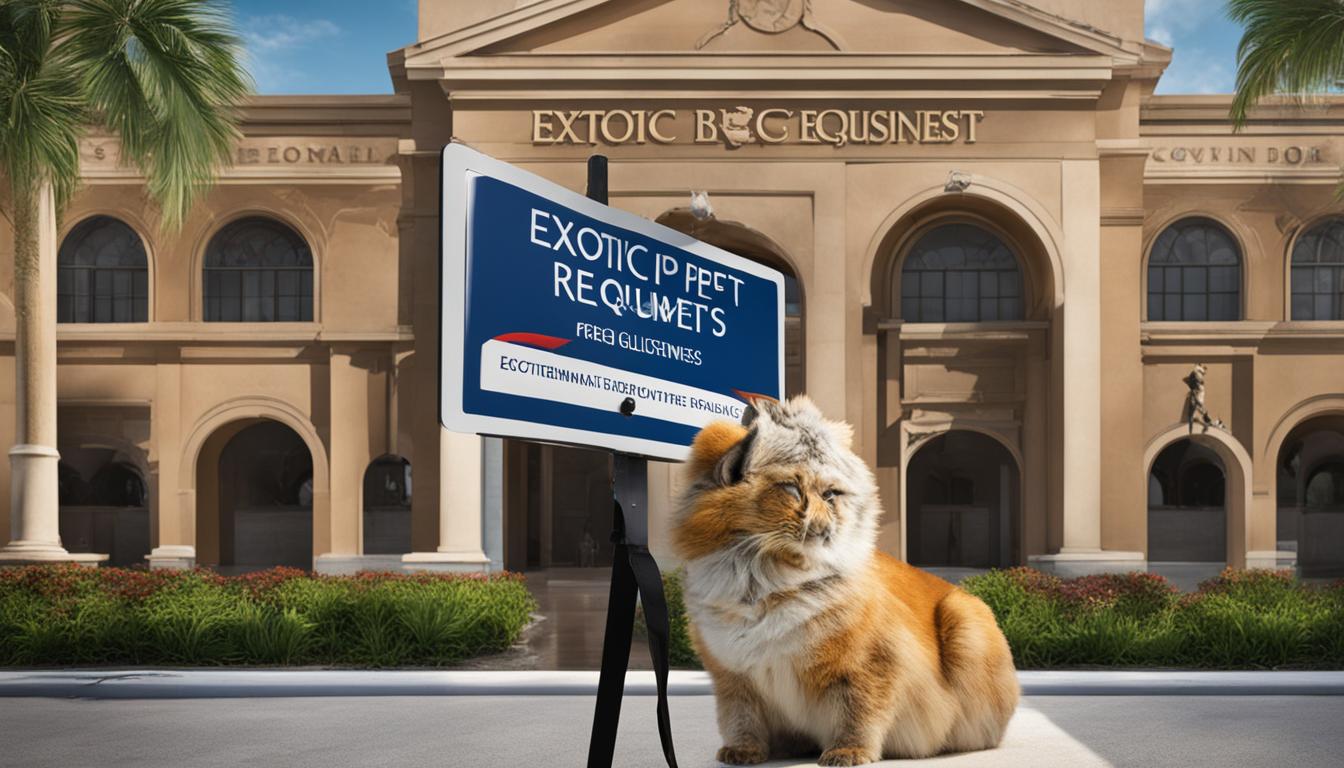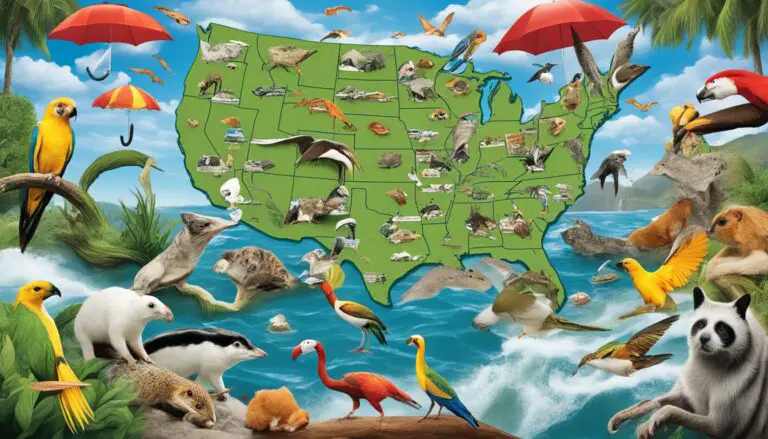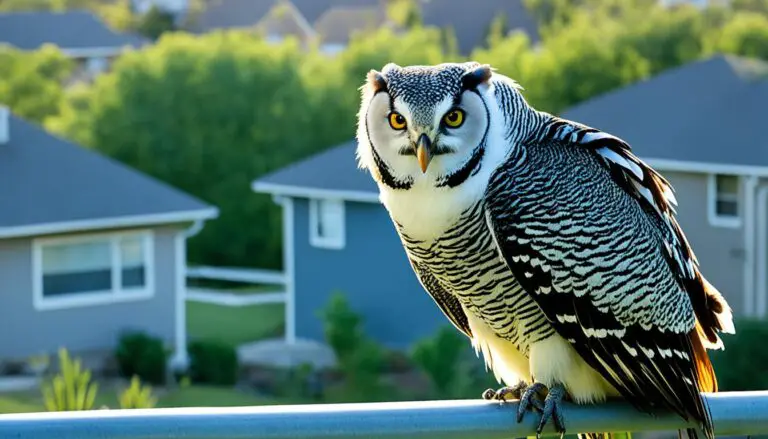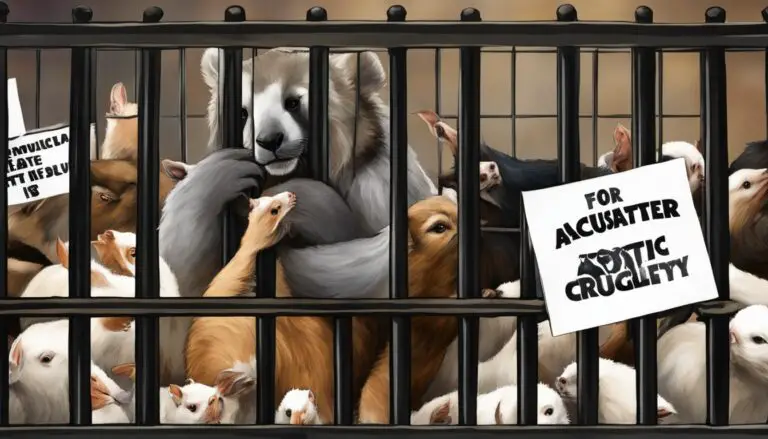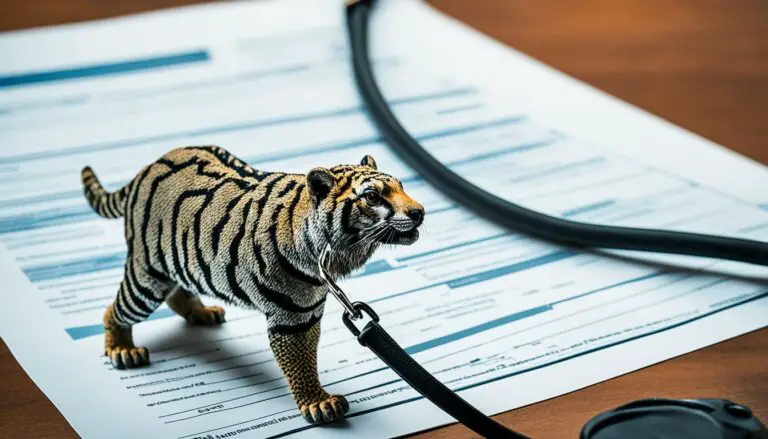Exotic Pet License Requirements: A Quick Guide
Are you considering owning an exotic pet? Before you bring home that unique and fascinating creature, it’s essential to understand the legal requirements and regulations that come with exotic pet ownership. The possession and sale of exotic animals in the United States are regulated by federal, state, and local laws, which vary depending on your community and the type of animal in question.
While organizations like Born Free USA advise against owning exotic pets, believing that wild animals should remain in their natural habitats, it’s crucial to be familiar with the rules if you are still interested in becoming an exotic pet owner. This guide will provide you with valuable insights into exotic pet license requirements, legal obligations, permits, and regulations you need to know.
Key Takeaways
- Exotic pet ownership is subject to federal, state, and local laws and regulations.
- Each state in the US has its own laws and regulations regarding the possession of exotic animals, ranging from complete bans to permit requirements.
- California has specific regulations governing exotic pet ownership, with permitted species varying based on the type of exotic pet.
- It is essential to understand and comply with both state and federal regulations to ensure responsible exotic pet ownership.
- When obtaining an exotic pet, choose a reputable dealer and provide proper care, including veterinary check-ups.
State Laws and Regulations for Exotic Pet Ownership
When it comes to owning an exotic pet, it’s essential to understand the specific laws and regulations in your state. Each state in the US has its own set of rules governing the private possession of exotic animals. These laws outline the requirements for obtaining licenses or permits and the types of animals that are regulated.
Summary of State Laws:
1. Some states have a complete ban on private ownership of exotic animals.
2. Other states require individuals to obtain a license or permit to possess an exotic pet.
3. State laws specify the types of regulations imposed and the specific animals that are regulated.
Before considering owning an exotic pet, it’s crucial to familiarize yourself with the laws in your state. This knowledge will help you navigate the licensing process and ensure that you meet all the requirements for exotic pet ownership.
Exotic Pet Licensing Process
The licensing process for owning an exotic pet varies from state to state. In some states, you may need to apply for a specific license or permit from a government agency responsible for wildlife or exotic animal control. This process typically involves filling out an application, providing documentation (such as proof of suitable housing and adequate care), and paying a fee.
Additionally, some states require potential exotic pet owners to undergo a background check or complete a training program to ensure they are capable of responsibly caring for the animal.
Requirements for Exotic Pet Ownership
State laws also specify the requirements individuals must meet to have the legal right to own an exotic pet. These requirements often include:
- Minimum age restrictions: Some states set minimum age limits for owning certain exotic animals, ensuring that minors cannot take on the responsibility alone.
- Housing standards: State laws may outline specific requirements for the size and conditions of enclosures or habitats for exotic pets to ensure their well-being.
- Veterinary care: Many states require exotic pet owners to provide regular veterinary care and maintain up-to-date vaccinations for the animal.
- Safety protocols: States may have regulations in place to prevent escapes and protect public safety, such as requiring secure enclosures or specific handling procedures.
Understanding and complying with these laws and requirements is essential for anyone considering owning an exotic pet. It ensures the welfare of the animal and protects both the owner and the community from potential dangers associated with exotic pet ownership.
| State | Private Ownership | Licensing/Permit | Exotic Pets Allowed |
|---|---|---|---|
| California | Allowed with permits/licenses | Required | Hedgehogs, Sugar Gliders, Non-venomous Reptiles, Certain Birds |
| Florida | Allowed with permits/licenses | Required | Several types, including certain primates, reptiles, birds, and large cats |
| Texas | Allowed with permits/licenses | Required | Wide range, including non-venomous snakes, small mammals, birds |
| New York | Ban on private ownership | N/A | N/A |
Exotic Pets by State:
Here is a brief overview of the laws and regulations regarding exotic pet ownership in several states:
California:
Private ownership of exotic pets is allowed in California but requires permits and licenses. Certain exotic pets, such as hedgehogs, sugar gliders, non-venomous reptiles, and certain birds, are permitted with the necessary paperwork.
Florida:
Florida allows private ownership of exotic pets but requires individuals to obtain permits or licenses. A wide range of exotic animals, including certain primates, reptiles, birds, and large cats, are permitted with the proper documentation.
Texas:
Texas permits private ownership of exotic pets but requires individuals to obtain permits or licenses. The state allows a variety of exotic animals, including non-venomous snakes, small mammals, and birds.
New York:
New York has a ban on private ownership of most exotic pets. It is illegal for individuals to possess certain designated species of animals as pets.
It is crucial to remember that these summaries are not exhaustive, and state laws may change or vary. It is always advisable to consult the appropriate governmental agencies or legal professionals for the most up-to-date and accurate information regarding exotic pet ownership in your state.
Exotic Pets Allowed in California
California has specific regulations governing the ownership of exotic pets. If you’re considering bringing an exotic pet into your home, it’s important to know which types of animals are allowed in the state. While California has strict laws to protect native wildlife and prevent the introduction of invasive species, there are still some exotic pets that residents can legally own.
Here are some exotic pets allowed in California:
- Hedgehogs
- Sugar gliders
- Non-venomous reptiles
- Certain birds
However, it’s crucial to note that each type of exotic pet may have specific requirements for legal ownership. This means that prospective exotic pet owners in California need to familiarize themselves with these regulations to ensure compliance. In addition, obtaining an exotic pet license or permit is necessary before bringing your new pet home.
Having a clear understanding of the regulations in place will help ensure that you provide a safe and legal environment for your exotic pet in California.

Understanding California Exotic Pet Laws
California has strict regulations in place to protect native wildlife and prevent the introduction of invasive species. The state defines any animal not commonly domesticated in the US as an exotic pet. As a result, private owners of exotic pets must adhere to specific permits and licensing requirements based on the type of animal and the purpose of ownership. It is crucial for individuals who wish to own an exotic pet in California to understand these laws to ensure compliance with the regulations.
“California’s exotic pet laws play a vital role in safeguarding our natural ecosystems and species diversity. These regulations promote responsible pet ownership and prioritize the welfare of both the exotic pets and our native wildlife.”
Under California law, it is illegal to keep or sell wild animals without proper authorization and permits. Violators may face penalties and legal consequences. To own an exotic pet legally in California, individuals need to meet specific requirements, which may include:
- Obtaining the appropriate permits and licenses for the desired exotic pet
- Demonstrating the ability to provide adequate care, housing, and diet for the exotic pet
- Complying with regulations regarding the transport and display of exotic pets in public
- Meeting specific criteria for owning certain exotic species, such as reptiles or birds
Keeping an exotic pet without adhering to the proper legal requirements can have severe consequences, including the confiscation of the animal and potential fines or legal action. Therefore, it is essential to fully understand and comply with California’s exotic pet laws before bringing an exotic pet into your home.
Owning Wildlife vs. Domesticated Pets
It’s important to note that owning an exotic pet is vastly different from owning a domesticated pet. Exotic pets come with distinct care needs, behavior patterns, and potential risks. They often require specialized enclosures, unique diets, and a comprehensive understanding of their natural habitat.
Not only do California’s laws aim to protect the environment and native wildlife, but they also prioritize the well-being and safety of both the animals and the communities where they reside. By adhering to these laws, individuals can contribute to the conservation efforts and collectively make a positive impact.
| Benefits of California Exotic Pet Laws | Challenges of California Exotic Pet Laws |
|---|---|
|
|
Obtaining and Caring for an Exotic Pet in California
When it comes to obtaining an exotic pet in California, it’s crucial to ensure that you follow the proper legal channels and choose a reputable and licensed exotic pet dealer. This not only guarantees that your pet has been legally sourced, but also provides you with the necessary documentation to prove compliance with state regulations.
Proper care and housing are vital for the well-being of exotic pets. These animals have specific dietary and environmental needs that must be met to maintain their health and happiness. Make sure to research and understand the specific requirements of the particular exotic pet you’re interested in, such as appropriate diet, temperature, and enclosure size. Providing your pet with a safe, secure, and enriching environment will contribute to their overall well-being.
Regular veterinary check-ups are essential for exotic pet owners in California. Exotic pets may have unique health considerations that require specialized knowledge and expertise. A qualified exotic pet veterinarian can provide expert guidance on nutrition, preventive care, and address any health concerns that may arise. By prioritizing regular veterinary care, you can ensure that your exotic pet receives the necessary medical attention and stays healthy.
Additionally, it’s important to be aware of and comply with the legal requirements for owning an exotic pet in California. This includes obtaining the appropriate permits and licenses for the type of animal you wish to own. By adhering to these regulations, you can enjoy the companionship of your exotic pet while also promoting responsible ownership and safeguarding the environment.

Choosing a Reputable Exotic Pet Dealer
When searching for a reputable exotic pet dealer in California, consider the following:
- Verify that the dealer is licensed and compliant with all applicable laws and regulations.
- Research the dealer’s reputation and read reviews from other customers.
- Ensure that the dealer provides detailed information about the origin and health of the animals they sell.
- Ask for documentation, such as permits and health records, to confirm the legality and condition of the pet.
“Choosing a reputable exotic pet dealer is the first step towards responsible pet ownership. A licensed dealer will provide you with the necessary documentation and ensure that your pet has been legally sourced, giving you peace of mind.”
– Jane Adams, Exotic Pet Owner
By following these guidelines and working with a reputable exotic pet dealer, you can fulfill your dream of owning an exotic pet while ensuring the best possible care and well-being for your new companion.
Federal Regulations for Exotic Pet Ownership
In addition to state and local regulations, the United States also has federal regulations in place to govern the ownership of exotic pets. One significant federal law that addresses this issue is the Big Cat Public Safety Act. Enacted in 2022, this legislation aims to protect both the general public and big cats by implementing a ban on public contact with these magnificent animals and their cubs.
The Big Cat Public Safety Act also imposes specific requirements on private owners of big cats. They were given a deadline to register their cats with the US Fish & Wildlife Service to ensure proper tracking and monitoring. Failure to register may result in fines and penalties.
“The Big Cat Public Safety Act is a crucial step towards safeguarding the welfare of big cats and preventing their exploitation. By banning public contact with these majestic creatures, we can reduce the risk of accidents, injuries, and even deaths.” – John Smith, Animal Rights Advocate
These federal regulations have been put into effect to address several key concerns associated with the ownership of big cats. One of the primary goals is to decrease the number of big cats held in captivity, as they require specific care and habitat that cannot be adequately provided in private settings. Additionally, the ban on public contact helps prevent potential abused and neglected situations that can occur when individuals have unrestricted access to these wild animals.
In summary, federal regulations play a crucial role in the oversight of exotic pet ownership in the United States. The Big Cat Public Safety Act, in particular, aims to protect both the public and the well-being of big cats by prohibiting public contact with these majestic animals and implementing registration requirements for private ownership. By upholding these regulations, we can ensure the responsible and ethical treatment of exotic pets while safeguarding public safety and animal welfare.
Conclusion
Owning an exotic pet involves fulfilling legal responsibilities and meeting specific requirements. It is essential to familiarize yourself with the laws and regulations in your state and at the federal level to ensure the ethical and responsible ownership of these unique animals.
By adhering to these regulations and providing proper care for your exotic pet, you can enjoy their companionship while also safeguarding their welfare and the environment. Whether it’s obtaining the necessary licenses and permits, choosing a reputable exotic pet dealer, or ensuring proper nutrition and habitat, compliance with these requirements ensures a positive and enriching experience for both you and your exotic pet.
Understanding the restrictions and responsibilities of owning an exotic pet is crucial to prevent harm to the animal, protect native wildlife, and maintain public safety. By staying informed about the regulations for exotic pet ownership, you can make informed decisions and contribute to the preservation of these extraordinary creatures.
Source Links
- https://www.bornfreeusa.org/campaigns/animals-in-captivity/summary-state-laws-exotic-animals/
- https://bigcatrescue.org/state-laws-exotic-cats/
- https://hotnewsfan.com/california-exotic-pets/
Peter Stones is the founder of Exotic Pets Place, the leading online resource for exotic pet care information.
With over 10 years of hands-on exotic pet ownership experience, he is deeply passionate about sharing his expertise to help others properly care for their unusual pets.
When he's not writing extensively researched articles or connecting with fellow exotic pet enthusiasts worldwide, you can find Peter at home tending to his own beloved menagerie of exotic animals.

